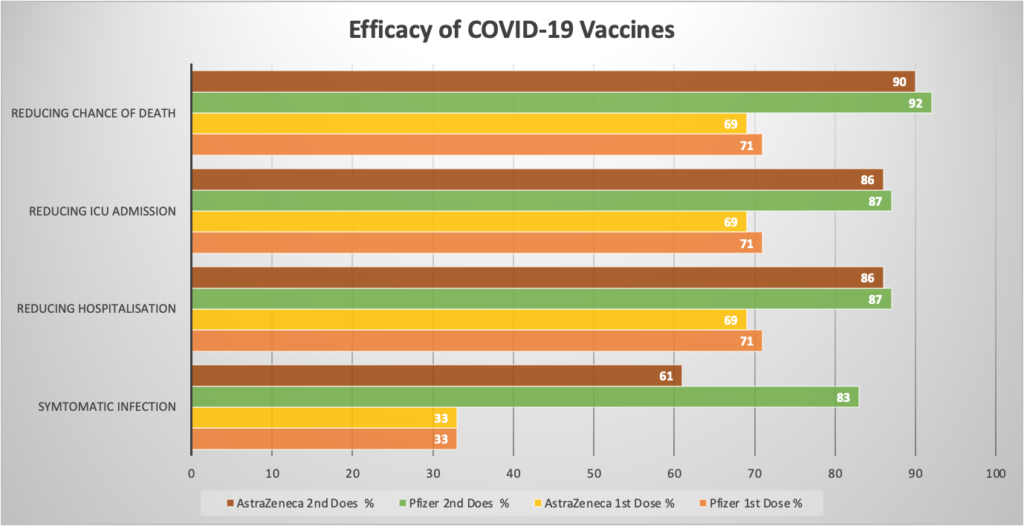
COVID-19 is the most critical health problem worldwide. The SARS-CoV-2 virus causes COVID-19. It is a worrying time for everyone and understandably a cause of anxiety and concern as the information and advice change daily. Endometriosis is another major women’s health issue and understandably, over the last few months, I have received several phone calls and emails from my concerned patients about COVID-19 and its impact on endometriosis and their suitability for the vaccine.
- Does having endometriosis increase my risk of contracting COVID-19?
- Can I take a COVID-19 vaccine if I have endometriosis?
Endometriosis & the risk of COVID-19 Infection
Endometriosis is an inflammatory condition, and it is not an infection. It is immune-mediated but is not an auto-immune disease, meaning no known antibodies are produced as a reaction to endometriosis lesions. Endometriosis is not considered an immune-compromised condition. Women with endometriosis are not necessarily more prone to contracting the COVID-19 virus than the background risk. If you have endometriosis, your best defence against the virus and stop the spread of the disease is to follow NSW Health advice and get the vaccination, wear a mask, minimise social contact and regular hand hygiene.
Nonetheless, a tiny population of women who have Thoracic endometriosis (endometriosis within the chest cavity involving the lungs or on the diaphragm) could be more at risk. Please note this is a rare type of endometriosis and the incidence of thoracic endometriosis in the general population is unknown. However, it has been reported in <1% of women undergoing pelvic surgery for suspected or known pelvic endometriosis. COVID-19 is a respiratory tract infection; those with pre-existing respiratory (breathing) problems are more at risk. For patients with thoracic endometriosis or who have undergone lung surgeries, COVID-19 can pose a risk. These patients should take extra precautions and limit their risk of exposure to respiratory infections.
Endometriosis & COVID-19 Vaccination
COVID-19 vaccine contains a small inactivated part of the virus, and it cannot give you COVID-19 disease. After getting the vaccine, your immune system will learn to recognise and fight against the SARS-CoV-2 virus, which causes COVID-19. Protection against COVID-19 starts from about 2–3 weeks after the first dose. One dose gives only some short-term protection. Two doses will give optimal protection. No vaccine is 100% effective, so it is possible to get a COVID-19 infection and get sick or transmit the virus to your family and friends even after vaccination.
Patients with endometriosis do not appear to be at any more risk of vaccine-related complications than the general population. Vaccination is voluntary and free. The research data from Doherty Institute is overwhelmingly in favour of vaccination, as suggested below.
| Pfizer | AstraZeneca | Pfizer | AstraZeneca | |
| 1st Dose | 1st Dose | 2nd Dose | 2nd Dose | |
| % | % | % | % | |
| Symptomatic infection | 33 | 33 | 83 | 61 |
| Reducing Hospitalisation | 71 | 69 | 87 | 86 |
| Reducing ICU admission | 71 | 69 | 87 | 86 |
| Reducing Chance of Death | 71 | 69 | 92 | 90 |

| DOHERTY MODELLING REPORT REVISED 10TH AUGUST 2021 |
Please discuss any concerns or questions you have about the COVID-19 vaccination with your immunisation provider and/or your GP before you receive the vaccine. If you wish to read the information, please click on the links below.
DOHERTY MODELLING REPORT REVISED 10TH AUGUST 2021
AstraZeneca Vaccine and the COVID-19 vaccination program – Click here for more information
Information on COVID-19 Pfizer (Comirnaty) vaccine – Click here for more information
Dr Yogesh Nikam is a Specialist Gynaecological Surgeon, with a special interest in complex gynaecological issues and works as a member of a multi-disciplinary team involving Colorectal surgeons, Urologists, Pain specialists and Allied health specialists.
Call 1300 724 380 to make an appointment.
